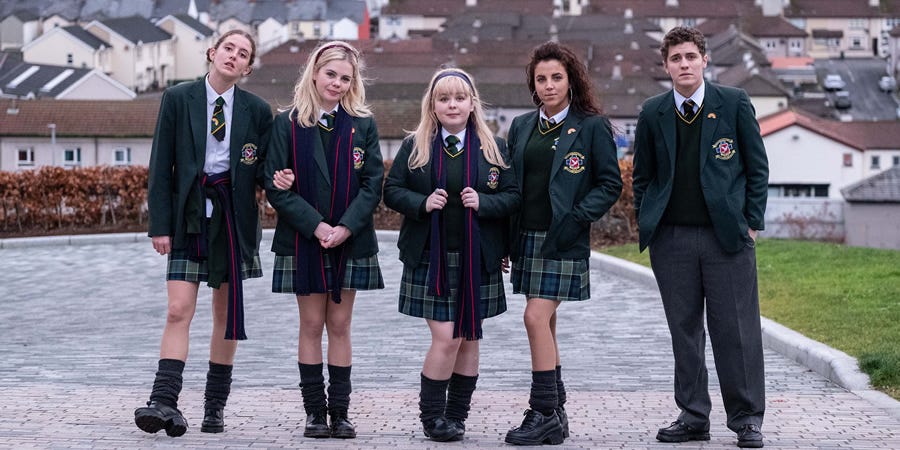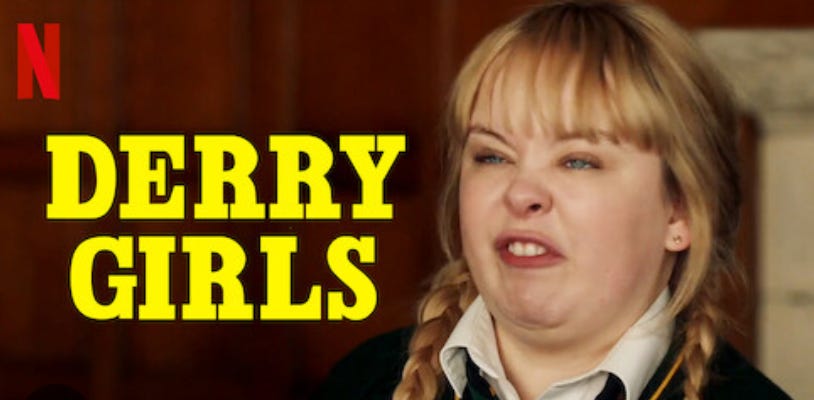Derry Girls
Why you must watch, and will laugh and cry over, a hilarious coming-of-age memoir set in Northern Ireland near the end of The Troubles
A recorded version of this piece is available to listen to here.
I have been putting off writing about a show that I’ve been in love with for over a year (because it’s hard to put the love into words), and realized it’s finally time for me to tell you about it so that you can join in the heartfelt and hilarious lives of four high school girls and one boy living in the mess of the Troubles in Ireland in the mid 1990’s.
Whenever I mention Derry Girls in a social setting, everyone’s mind automatically imagines the word “dairy” and they wonder why they would want to watch a show about girls milking cows.
No, this show is not about cows or milk. The name “Derry” refers to the city in which our show takes place: Londonderry is a city in Northern Ireland that was affected by the civil conflict between Catholics and Protestants. Apparently, the Troubles even started in Derry with the “Battle of the Bogside.”
Since I was young, I’ve loved historical fiction. I’ll read or watch anything about my favorite periods and figures in history. The wild thing is Derry Girls is essentially that — a historical fiction about a very recent time in our history, the end of the Troubles in Northern Ireland in the 1990’s. But this historical fiction features songs we know and fashion trends we recognize because we may have been alive or just starting out (me) at the time this was all taking place.
Here is where I get to share about one of the best books I’ve ever read and recommend to everyone. If I hadn’t somewhat randomly read this book three years ago, I don’t think Derry Girls would have hit me with quite the same level of meaning and significance.
The book is called Say Nothing: A True Story of Murder and Memory in Northern Ireland by Patrick Radden Keefe, a staff writer at The New Yorker, researcher and journalist, and narrative nonfiction writer. The story Keefe weaves in Say Nothing is astounding, and I devoured this 450 page book like it was a romance beach read. While I read constantly in my life, I also read slowly, so it’s truly amazing how quickly I raced through this book, staying up late in bed to find out what happened next.
I had to exercise restraint to not underline sentences that thrilled me, since I borrowed the book from my best friend, who had discovered Say Nothing at a bookstore in Vermont. (I love when that happens: we didn’t read about the book on a bestseller list, or have it recommended to us. It jumped out at Alli in the store, and it turned out to be a 10/10.)
When Alli was starting the book, I remember our early conversations about it: what shocked us about the content was 1) we had never heard of, or learned about, the Troubles, 2) the civil war and civilian-on-civilian violence happened so recently in history, and 3) who was to say that something like the Troubles couldn’t break out in America? It was 2020 that year, after all.
What we take for granted — physical safety, our homes and belongings, shelter, food, our lives, our futures — people in Northern Ireland as recently as the 1980’s and 90’s did not have guaranteed. There were car bombs in the street, your friends and neighbors could have been secret members of the IRA, and you or someone you love could be “disappeared” at any moment.
How could this insane historical event have taken place so recently, still affecting people to this day, and we had never heard about it? The whole experience of reading Say Nothing and learning about The Troubles felt so weighty.
Enter Derry Girls.
As I reflected on why I love this series so much, it occurred to me that the show is not so much historical fiction as a memoir told through the medium of a television series. And I love memoir.
I’m currently reading The Art of Memoir by Mary Karr. She says that memoirs are held together by “happenstance, theme, and (most powerfully) the sheer convincing poetry of a single person trying to make sense of the past.” And, she says, “the best ones come from the soul of a human unit oddly compelled to root out the past’s truth for his own deeply felt reasons.”
Lisa McGee is the creator and writer of Derry Girls. She was born in Londonderry, Northern Ireland in 1980. Which means that she lived and experienced Derry at the same age as her protagonists in Derry Girls.
Karr, who lived quite a wild life and has written three memoirs, says, “A first-person coming-of-age story, putatively true, never failed to give the child me hope that I could someday grow up and get out of the mess I was in.”
McGee lived a version of the story she tells in Derry Girls. Her life, and the girls lives, are ordinary. They go through things that every teenage girl goes through: crushes and heartbreak, wanting to go to a concert when your parents don’t want you to, wearing school uniforms, having birthday parties, hurting each other and making up.
But their lives are also extraordinary because of the time and place they lived in. There are armed military personnel everywhere. Their school bus gets stopped and searched at a check point. While the girls perform at a school talent show, their family at home watches news reports of more violence and political strife.
These are sobering moments in a funny show, but understanding the backdrop also makes some of the comedic moments even more funny. For example, in episode 1 of season 2, “Across the Barricade”, one of the girl’s hysteria about repelling down a (short) cliffside with a Protestant boy as her partner makes so much more sense, and is that much more hilarious, when you understand the Troubles as the backdrop to this story. Otherwise, why is it a big deal that the Protestant boys and Catholic girls have to spend a day together rock climbing and talking about things they have in common?
The memoir overtones are strong. The show opens with lines from Erin’s diary. Erin represents McGee: she’s the closest thing we have to a narrator, and is the central Derry Girl because of that.
While working on this piece, I discovered a New Yorker profile of McGee. It’s excellent, and I wish I had written it! I learned that McGee wanted to be a writer. She would journal about growing up and getting out of Derry. I also learned that McGee is the only writer on the show. Once you watch the show, you’ll understand how incredible this is. The dialogue is quick, witty, and surprising (and you will probably need subtitles on the first go-round).
The fact that Lisa McGee created and wrote the entire show reminds me a bit of Amy Sherman-Palladino, who created Gilmore Girls and The Marvelous Mrs. Maisel, and has writing credits for many of the episodes. What do these shows have in common? Very funny women talking very fast. I would love to see a McGee Sherman-Palladino collaboration!
In The New Yorker profile, McGee says that everything she’d read and watched about the Troubles was sad and dark. She never thought she would write about them because of that. She says, “There were never any jokes. I don’t know any Northern Irish person that isn’t funny.”1
This resonates with me, that humor gives us hope in seemingly hopeless situations. It’s better than positivity, because it can hold both the bad and the good at the same time. McGee’s point reminds me of something Stephen Colbert said during an interview with Dua Lipa.
Dua Lipa asks Colbert if his faith and comedy overlap, and if one wins out in the end. And Colbert responds by talking about his favorite movie of that year, Belfast. He says:
I’m Irish-American, and it’s such an Irish movie, and I think this is also a Catholic thing because it’s funny, and it’s sad, and it’s funny about being sad. In the same way, that sadness is like a little bit of an emotional death, but not a defeat if you can find a way to laugh about it because that laughter keeps you from having fear of it and fear is the thing that makes you turn to evil devices to save you from the sadness… so if there’s some relationship between my faith and my comedy, it’s that no matter what happens you are never defeated. You must understand and see this in the light of eternity, and find some way to love and laugh with each other.2
Derry Girls is McGee’s memoir, making sense of her past, and defeating the fear and death of The Troubles with love, laughter, and hope.
The adventures of the four girls, Erin, Michelle, Orla, Clare, plus Michelle’s English cousin James (who attends the all-girls Catholic school for fear of bullying at the boys school) are innocent, well-meaning, and wacky. They adore their parents, and fight with them, too. There is plenty of eye-rolling, begging, and parental sarcasm (“Oh you would like to use money from your trust fund, girls?”).
Our Derry girls have their own quirks that run strong throughout the show: Clare is prone to anxiety, especially when it comes to not following rules. Michelle talks a big talk about getting with guys sexually, but we never actually see her doing anything with a boy. Orla is a bit of a what I like to call an Amelia Bedelia character, and you can always count on her to say something out of pocket. Or you’ll spy her in the back of the crew doing something completely absurd and unrelated to what’s going on. And lastly, Erin, queen of the triple chin, always aghast and affronted with something someone has said or done. She thinks quite highly of herself, and it’s endearing.
Then there’s James, the fifth honorary Derry girl, whose reactions to shenanigans reflects, possibly, how we would react. He’s sincere, sweet, and kind. What’s not to love about James??
All five of the crew have absolutely no qualms about configuring the most ridiculous facial expressions, and their lack of on-screen self-consciousness really brings it all together. McGee told Anna Russel in the New Yorker interview that “she loved teen shows but often found the characters unrealistic.” She says, “The girls were always like the hot person the funny boys fancied.”
When I think back to shows from the early aughts that I wasn’t allowed to watch — Gilmore Girls, One Tree Hill, The OC, etc. — I could not agree with McGee more. These “teenagers” were nothing like me. I had crooked teeth not yet made straight by braces. I made weird faces, embarrassed myself, laughed too loudly to get attention, looked frumpy in my school uniform…
My best friend and I have said about another favorite show of ours, Pen15, that the adults playing the middle school girls are willing to make the most unattractive faces and do the silliest childish things, and that’s a key part of what makes the show so compelling to us. It couldn’t be more refreshing and relatable, and the same is true of Derry Girls, as evidenced even by the old banner image on Netflix:
One of my favorite things about Derry Girls is that the parents are intrinsic to almost every episode. Many episodes begin in the kitchen of Erin Quinn’s home with Mary Quinn, her ma, and Sarah McCool, Orla’s mom, chatting in the kitchen. Sarah is probably doing her makeup or something beauty-related, while Mary washes dishes, cooks, irons, or tries to calculate how many clementines she should eat to “drop a stone” before the high school reunion that night.
One of my favorite episodes (Season 3, Episode 5) isn’t about the girls at all. It’s about their parents going to said high school reunion with flashbacks to the night of their own high school dance when they were the same age as the girls. The teenage versions of themselves are mapped to Erin, Michelle, Orla, Clare, and James. Ah, we see where the girls get their traits. The apples don’t fall far.
The season 3 and show finale episode, “The Agreement” is, I think, a television masterpiece.
The title refers to the Good Friday Agreement of 1998, which was aimed at bringing an end to the political violence and strife of The Troubles. Of particular concern for citizens was the release of prisoners from both sides who had been active members of the paramilitary groups. Since the Derry girls just turned 18, they have the opportunity to vote on the referendum to approve the agreement between the Irish and British governments.
Erin asks her grandad what he thinks about the referendum that they would be voting on in a matter of days. Joe says, as Erin’s little sister sits on his lap, “Oh, it doesn’t matter what I think. Sure, I’m an old man. It’s what you think that’s important.”
Erin responds, “People died. Innocent people died, Granda. They were someone’s mother, father, daughter, son. Nothing can ever make that OK. And the people who took those lives, they’re just gonna walk free? What if we do it and it was all for nothing? What if we vote yes and it doesn’t even work?”
Granda says, “And what if it does? What if no one else has to die? What if all this becomes a ghost story you’ll tell your wains one day? Hmm? A ghost story they’ll hardly believe?”
Moments later, Erin — after many sappy, melodramatic orations and journal entries in previous episodes — finally says something quite profound when James asks her how it feels to be 18. Her answer is an ode to the people who lived through and grew up during The Troubles. We listen, as real footage of daily life in Northern Ireland is displayed, from children playing on a playground to civil rights marches to paramilitary violence and political speeches, as we watch our characters go to the polls to vote on the referendum and change history.
But I won’t spoil what Erin says here. I’ll go write it on a piece of paper and pin it on my wall because it sums up perfectly what it’s like to grow up, and keep growing up every day, in Northern Ireland and anywhere else in the world.
I recently talked to a friend who said I inspired her to watch Derry Girls again for the third time. It’s so easy to watch, and it’s quick, she said. Which is true: there are seven episodes in each season, and most are under 30 minutes.
But it’s also worth watching three times and more. You’ll catch things you didn’t before (Orla in the background, stepping), you’ll be able to turn off the subtitles, and you’ll feel a little bit like you’ve come home. At least, I do.
I’ve already watched it through twice and I know I’ll watch it again and again. Just like a book you reread throughout your life, that’s how you know the show is a classic.
So, read Say Nothing, read the Lisa McGee New Yorker profile, add Derry Girls to your watchlist, and start A-S-A P. It’s perfect for fall, perfect for the school year. And I know that I will be paying attention to whatever Lisa McGee does next.
Anna Russel, “How the Creator of ‘Derry Girls’ Found Humor in a Troubled Time,” The New Yorker, June 2, 2022.




